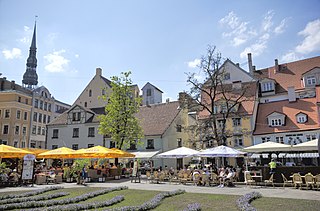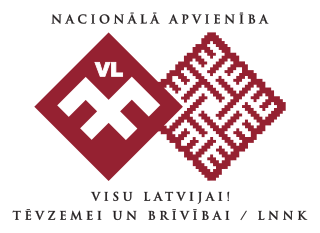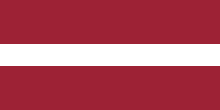
Latvia, officially the Republic of Latvia, is a country in the Baltic region of Northern Europe. It is one of the Baltic states; and is bordered by Estonia to the north, Lithuania to the south, Russia to the east, Belarus to the southeast, and shares a maritime border with Sweden to the west. Latvia covers an area of 64,589 km2 (24,938 sq mi), with a population of 1.9 million. The country has a temperate seasonal climate. Its capital and largest city is Riga. Latvians belong to the ethno-linguistic group of the Balts and speak Latvian, one of the only two surviving Baltic languages. Russians are the most prominent minority in the country, at almost a quarter of the population.

Demographic features of the population of the historical territory of Latvia include population density, ethnic background, education level, health of the populace, economic status, religious affiliations and other aspects of the population.

Foreign relations of Latvia are the primary responsibility of the Ministry of Foreign Affairs. Today's Republic of Latvia regards itself as a continuation of the 1918–1940 republic. After the declaration on the restoration of its full independence on August 21, 1991, Latvia became a member of the United Nations on September 17, 1991, and is a signatory to a number of UN organizations and other international agreements. Latvia welcomes further cooperation and integration with NATO, European Union, OECD and other Western organizations. It also seeks more active participation in UN peacekeeping efforts worldwide.

Riga is the capital and largest city of Latvia and is largest city in the Baltic states, and is home to 605,802 inhabitants which is a third of Latvia's population. The population of Riga metropolitan area, which stretches beyond the city limits, is estimated at 860,142. The city lies on the Gulf of Riga at the mouth of the Daugava river where it meets the Baltic Sea. Riga's territory covers 307.17 km2 (118.60 sq mi) and lies 1–10 m (3.3–32.8 ft) above sea level, on a flat and sandy plain.

The Baltic states or the Baltic countries is a geopolitical term, which currently is used to group three countries: Estonia, Latvia, and Lithuania. All three countries are members of NATO, the European Union, the Eurozone, and the OECD. The three sovereign states on the eastern coast of the Baltic Sea are sometimes referred to as the "Baltic nations", less often and in historical circumstances also as the "Baltic republics", the "Baltic lands", or simply the Baltics.

Latvians are a Baltic ethnic group and nation native to Latvia and the immediate geographical region, the Baltics. They are occasionally also referred to as Letts, especially in older bibliography. Latvians share a common Latvian language, culture, history and ancestry.

Latvia has participated in the Eurovision Song Contest 23 times since making its debut at the contest in 2000, where the group Brainstorm finished third with the song "My Star". Latvia won the contest in 2002, with Marie N and the song "I Wanna", defeating Malta by 12 points. Latvia is the second former Soviet country to win the contest. The 2003 contest was held in the Latvian capital Riga. The country achieved its third top 10 result in 2005, when Walters and Kazha finished fifth with "The War Is Not Over".

Capital punishment in Latvia was abolished for ordinary crimes in 1999 and for crimes committed during wartime in 2012. Latvia is party to several international instruments which ban capital punishment.

The main religion traditionally practiced in Latvia is Christianity. As of 2019, it is the largest religion (68.84%), though only about 7% of the population attends religious services regularly.
Unity is a liberal-conservative political party in Latvia. It is a member of the New Unity alliance and is positioned on the centre-right on the political spectrum.

The Latvian Women's League is the top level women's football league of Latvia.

The National Alliance, officially the National Alliance "All for Latvia!" – "For Fatherland and Freedom/LNNK", is a national-conservative and right-wing populist political party in Latvia. A right-wing party, it has also been placed as the far right, or radical right, of the political spectrum. It is economically liberal.
Latvia participated in the Eurovision Song Contest 2011 with the song "Angel in Disguise" written by Marats Ogļezņevs. The song was performed by the duo Musiqq. The Latvian broadcaster Latvijas Televīzija (LTV) organised the national final Eirodziesma 2011 in order to select the Latvian entry for the 2011 contest in Düsseldorf, Germany. Twenty songs were selected to compete in the national final, which consisted of four shows: two heats, one Second Chance round and a final. In the heats, five entries were selected to advance from each show: three entries selected based on a public televote and two entries selected by a seven-member jury panel. In the Second Chance round, two entries were selected to advance: one selected based on a public vote and one selected by the jury. Twelve songs ultimately qualified to compete in the final on 26 February 2011 where two rounds of voting by the public and jury selected "Angel in Disguise" performed by Musiqq as the winner.

Latvia competed at the 2012 Summer Olympics in London, United Kingdom from July 27 to August 12, 2012. This was the nation's tenth appearance at the Summer Olympics.
The 2011 Latvian Higher League was the 20th season of top-tier football in Latvia. It began on 15 April 2011 and ended on 5 November 2011.

Latvia competed at the 2011 World Championships in Athletics from August 27 to September 4 in Daegu, South Korea.
Latvia participated in the Eurovision Song Contest 2012 with the song "Beautiful Song" written by Ivars Makstnieks and Rolans Ūdris. The song was performed by Anmary. The Latvian broadcaster Latvijas Televīzija (LTV) organised the national final Eirodziesma 2012 in order to select the Latvian entry for the 2012 contest in Baku, Azerbaijan. Twenty songs were selected to compete in the national final, which consisted of three shows: two semi-finals and a final. In the semi-finals on 7 and 14 January 2012, five entries were selected to advance from each show. Ten songs ultimately qualified to compete in the final on 7 January 2012 where two rounds of voting by a public televote and a ten-member jury panel selected "Beautiful Song" performed by Anmary as the winner.

FK Spartaks is a Latvian football club that is based in Sloka, Jūrmala. In 2012, they finished 3rd in the Latvian First League championship and after winning the play-offs against JFK Olimps were promoted to the Latvian Higher League. The club plays its home matches at the Sloka Stadium with capacity of 2,500 people.
The 2013 Latvian Supercup was the first edition of the Latvian Supercup, an annual football match organised by Latvian Football Federation and contested by the reigning champions of the two main Latvian club competitions, the Latvian Higher League and the Latvian Football Cup. It was played at the Celtnieks Stadium in Daugavpils on 9 March 2013, between the 2012 Latvian Higher League winners Daugava and the 2011–12 Latvian Football Cup winners Skonto.











